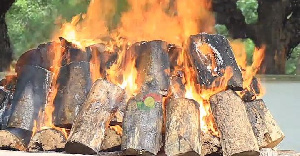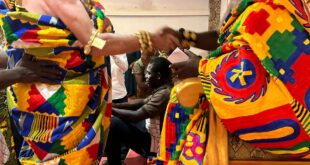Persons who die from Coronavirus complications are buried under strict supervision of environmental health workers but some of the bodies are disposed of through cremation.
This is the 116th COVID-19 body being disposed of under the supervision of the environmental health workers of the Accra Metropolitan Assembly (AMA).
The family of the 116th body, a Hindu one, opted for cremation, the act of burning the body, in a manual crematorium at the Osu cemetery in Accra.
The cremation took place on Saturday, August 29 amidst reciting of funeral chants and other songs.
Why cremation?
Multiple papers reveal Hindus traditionally cremate their dead because a fiery dissolution of the body brings swifter, more complete release of the soul than burial.
They believe after death, the departed soul hovers close to the earth.
The traditional sects and sub-sects believe the funeral rites and burning of the body signify spiritual release, notifying the soul that, in fact, death has come.
In some countries, cremation on an open-air pyre is an ancient tradition.
But the ancient tradition, which used to be popular in India and Nepal, has been adopted by many – since the nineteenth century.
With time, mechanized forms of carrying out the exercise have become popular.
Cremation versus Land burial in Ghana
As burial spaces in Ghana’s capital continue to run out, this could be an option.
The Public Health Officer at the Accra Metropolitan Assembly (AMA), Joseph Asitanga, says, “Ghana’s land spaces are all used up. And the situation in our major cemeteries is no different.”
“To deal with this, an option we could adopt is cremation. This will make some space in the cemeteries available for those who do not believe in cremation,” Mr. Asitanga told 3news.com‘s Komla Adom.
Health experts say dead bodies still have body fluids which can transmit the SARS-CoV-2 virus, which causes COVID-19.
According to virologists, a dead body still has saliva and as a result secretions could be source of infection, therefore victims should be either buried or cremated with care.
Leader of the COVID-19 burial team Joseph Asitanga says cremation is eco-friendly and less expensive, although it is still heavily supervised.
“The cremation process is easier and obviously less expensive,” he says.
Mr. Asitanga adds, “It is sanitary because after this process, there is reduced environmental pollution.”
Unlike regular cremations, this one in a Covid-19 context is different.
No physical contact with the body for embalming and other rituals are permitted.
How long does it take?
For mechanized facilities like the Lashibi Funeral Home and Crematorium, an average of between three to five hours is enough.
The process is carried out at a temperature range of between 1400 and 1800 Fahrenheit – and this intense heat helps reduce the whole body to its primary elements and dried bone fragments.
But this manual process could take up to day.
Sixty-five-year-old George Ampem Sackey is a mortician.
He’s one of those who have to tend the fire at this crematorium till the body is completely burnt and prepare potions of the ash for collection by the families.
“I have been doing this for more than four years now,” he said.
Mr. Sackey’s job is to prepare logs for firewood in readiness for burning the body.
“Usually, I pile up the fire stumps and then when the body arrives, we lay in on the platform – and then wait for the family of the deceased and their ministers to offer prayers and recitals for the body.”
The experienced mortician says “after the prayers, they pile up some of the firewood on the casket till we are convinced it’s enough to burn red hot.”
“We also insert cotton, camphor and oil, at various parts of the firewood heap with the casket beneath and then invite the family of the dead to light up the flames.”
His job does not end there. Mr. Sackey would keep an eye on the burning pile nearly all day – ensuring he tends the fire intermittently until the body is completely burnt.
Concern
Environmental watchers believe this method, though generally less expensive, could impact the environment with the sheer volume of wood that has to be felled and used to tend the fire.
They are also worried about the disposal of the ashes from the exercise.
Mortician George Ampem Sackey says “after gathering portions of the ash for the family, we dispose of the rest in the sea.”
Remains from this exercise could be between £3 and £9, depending on the size of the body and other remains of the container and by-products.
After 12 hours or more, the relatives would return here to collect the ashes in an urn or any other container for continuation of their respective rites of passage.
While some in regular cremation decide to bury the ash, others keep them as memorabilia.
COVID-19 cremation stats
Two hundred and seventy persons have died from COVID-19-related complications in Ghana since the outbreak in March, as of August 29, 2020.
Out of the number, 116 have been buried under the supervision of the Accra Metropolitan Assembly.
So far, eight of the deceased have been cremated.
They include two Chinese, one Philippino, two Indians, two Ghanaians and one Australian.
Three of them were cremated at Lashibi crematorium and the other five at the Osu crematorium.
 Home Of Ghana News Ghana News, Entertainment And More
Home Of Ghana News Ghana News, Entertainment And More





